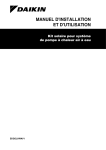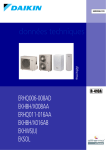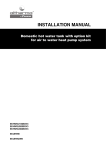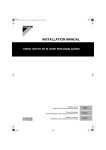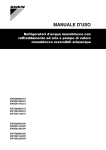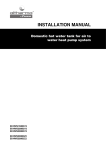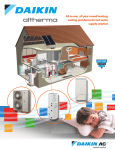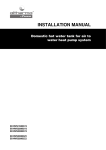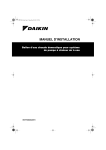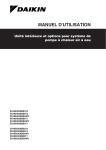Download EKSOL 1299KB Dec 10 2012 10:07:03 AM
Transcript
INSTALLATION AND OPERATION MANUAL Solar kit for air to water heat pump system EKSOLHWAV1 1 EKHW*150* EKHW*200* EKHW*300* 7 7 7 7 8 8 8 8 19 89 6 6 4 A 5 3 A 2 EKHW*150* EKHW*150* EKHW*200* 4 7 7 7 7 19 112 8 8 8 8 6 6 A 5 3 A 2 EKHW*200+300* 10 13 12 13 1 EKSOLHWAV1 CONTENTS Installation and operation manual Solar kit for air to water heat pump system Page Introduction ........................................................................................1 General information .....................................................................1 Scope of this manual...................................................................1 Model identification......................................................................1 General system setup and operation.................................................2 General system setup .................................................................2 Requirements and recommendations concerning field supplied solar panels and solar pump station......................2 Accessories .......................................................................................3 Accessories supplied with the solar kit........................................3 Overview of the solar kit ....................................................................4 Main components ........................................................................4 Installation of the solar kit ..................................................................4 Selecting an installation location .................................................4 Dimensions and service space....................................................4 Installation guidelines ..................................................................5 Installing the solar kit...................................................................5 Field wiring ..................................................................................6 INTRODUCTION General information Thank you for purchasing this solar kit. EKSOLHWAV1 The solar kit must be installed by a competent person and be installed in compliance with the instructions in this manual. The solar kit is to be connected to the domestic hot water tank. EKHW* The solar kit will enable you to heat up your domestic water by means of the sun whenever the sun is available. To get the most comfort and energy savings out of your system, make sure to observe the section "Configuring your system" on page 9 of this manual. Start up ..............................................................................................8 Scope of this manual Operating instructions........................................................................9 Configuring your system..............................................................9 This installation manual describes the procedures for installing and operating the EKSOLHWAV1 solar kit. Troubleshooting and servicing .........................................................11 General guidelines ....................................................................11 General symptoms ....................................................................11 Error codes................................................................................11 Disposal requirements .....................................................................11 Model identification EK SOL HW A V1 Technical specifications ...................................................................12 Annexes ...........................................................................................12 Decision flow of heating the domestic water by heat pump or by solar kit ......................................................12 Decision flow of heating the domestic water by booster heater ............................................................................. 13 V1 = 1P/230 V/50 Hz Series Domestic hot water Solar kit European Kit READ THESE INSTRUCTIONS CAREFULLY BEFORE INSTALLATION. PLEASE LEAVE THIS MANUAL WITH THE EKSOLHW SOLAR KIT AFTER INSTALLATION. IMPROPER INSTALLATION OR ATTACHMENT OF EQUIPMENT OR ACCESSORIES COULD RESULT IN ELECTRIC SHOCK, SHORT-CIRCUIT, LEAKS, FIRE OR OTHER DAMAGE TO THE EQUIPMENT. BE SURE ONLY TO USE ACCESSORIES MADE BY DAIKIN WHICH ARE SPECIFICALLY DESIGNED FOR USE WITH THE EQUIPMENT AND HAVE THEM INSTALLED BY A PROFESSIONAL. IF UNSURE OF INSTALLATION PROCEDURES OR USE, ALWAYS CONTACT YOUR DAIKIN DEALER FOR ADVICE AND INFORMATION. THE UNIT DESCRIBED IN THIS MANUAL IS DESIGNED FOR INDOOR INSTALLATION ONLY AND FOR AMBIENT TEMPERATURES RANGING 0°C~35°C. EKSOLHWAV1 Solar kit for air to water heat pump system 4PW41598-1 Installation and operation manual 1 GENERAL SYSTEM SETUP AND OPERATION Requirements and recommendations concerning field supplied solar panels and solar pump station General system setup Solar panel The solar kit is designed to transfer the heat from the solar panels to the heat exchanger of the domestic hot water tank EKHW* and is to be installed in the system as shown in the scheme below. Appropriate selection is to be made by your solar panel supplier, in accordance with local regulations. Solar pump station The solar pump station must meet following requirements: Electrical connection The solar pump station will have an auxiliary contact that closes when the contact for the pump of the solar pump station is operated. M This contact will provide 230 V to the input of the indoor unit, and prevent domestic water heating by the heat pump and/or booster heater during solar heating. For wiring examples, refer to the following drawings. Example 1 6 7 5 1 4 L N R1 N 8 2 3 1 Solar panels (field supply) 2 Solar pump station (field supply) 3 Solar kit 4 Domestic hot water temperature sensor of the solar pump station (field supply) 5 Domestic hot water temperature sensor of the indoor unit 6 Solar panel temperature sensor (field supply) 7 Solenoid 2-way valve (only for UK, refer to the EKUHW* kit) 8 Non-return valve (to be included in solar pump station or to be installed in field piping) Heating system. Refer to the indoor unit installation manual. The solar panels (1) catch the heat of the sun. When the temperature of the glycol solution in the solar panel has become higher than the water temperature in the domestic hot water tank, the pump of the solar pump station (2) and the pump of the solar kit (3) start to operate as to transfer the heat to the heat exchanger of the domestic hot water tank, unless priority is given to the heat pump. Refer to "Operating instructions" on page 9 (subsection: Configuring your system). YC Y1 Y2 Y3 Y4 P Solar pump station Indoor PCB: A4P 230 V Field wiring Solar pump station Indoor PCB: A4P Example 2 L N N R1 YC Y1 Y2 Y3 Y4 P Solar pump station Indoor PCB: A4P 230 V Field wiring Solar pump station Indoor PCB: A4P If the pump station has a speed controlled pump, make sure to disable this function so that the indoor PCB receives 230 V at all times. Installation and operation manual 2 EKSOLHWAV1 Solar kit for air to water heat pump system 4PW41598-1 ■ Settings ■ Anti-freeze setting Some solar pump stations have an anti-freeze function. If the solar panel temperature becomes too low, such solar pump stations will circulate the solar fluid as to extract heat from the tank and to avoid freezing of the solar fluid. Maximum solar panel temperature If the temperature of the solar panel is above this value, the solar pump station will stop or not resume pump operation. This setting will have a fixed value equal to or below 110°C, or it will be possible to put this value equal to or below 110°C. Make sure to disable this function. Make sure the concentration of glycol in the solar panel is big enough as to avoid freezing of the glycol at all times. Putting this value to a higher value can break down the pump of the solar pump station. Also refer to the eye-catcher caution label that was torn up when unpacking the installation manual. Limiting the maximum solar panel temperature to 110°C however, can affect efficiency of the solar panel. But on the other hand: ■ as it is important for reliability of the pump in the solar pump station only that temperature of the return water to that solar pump is lower than 110°C; Hydraulic connection Make sure the solar pump station has non-return valves as to avoid thermosiphon effect (migration of hot water to cold places). If the solar pump station has no hydraulic connections included, install them in the field piping as shown in "General system setup" on page 2. ■ and in case the 110°C limit for the return water temperature to the solar pump can be guaranteed by other means than by limiting the 'Maximum solar panel temperature'; ACCESSORIES then the value of the 'Maximum solar panel temperature' can be set to a higher temperature. Accessories supplied with the solar kit Please contact your local solar panel dealer. ■ ON/OFF/AUTO 1 If the solar pump station has an ON/OFF/AUTO function, make sure to put it on the AUTO function. This means that the pump will switch on automatically when the solar panel temperature rises sufficiently above the domestic hot water tank temperature and switch off automatically when the difference between the solar panel and the domestic hot water tank temperature becomes too low. 3 1x 7x 4 5 6 1x 5x 2x Maximum tank temperature Quantity ■ 2 1x When the maximum temperature of the domestic hot water tank is reached, the solar pump station will stop pump operation. Do not put this value above 80°C (70°C for units installed with the EKUHW* kit) to avoid overheating of the domestic hot water tank and the activation of the booster heater thermal protector in the domestic hot water tank. 1 8 7 1x 9 1x 1x 10 2x Necessary accessory for installation of the solar kit for each type of domestic hot water tank EKHW* EKHWSU 150* 200* 300* 150* 200* 300* Thermistor socket 1/2" Male BSP (internal diameter 6.1) 1 1 1 1 1 1 1 2 Connection pipe 3/4" Male BSP x 3/4” Male BSP 1 1 1 1 — — — Some solar pump stations provide the possibility to still dump heat to the domestic hot water tank, even when the maximum domestic hot water tank temperature is already reached. This to reduce the solar panel temperature by circulating the solar panel fluid and transfer the heat to the domestic hot water tank. 3 Sealing 7 6 7 7 7 6 6 4 Adaptor 3/4" Female BSP x 3/4" Male BSP 1 — 1 1 — — — 5 Adaptor 3/4" Male BSP x 3/4" Male BSP 5 5 5 5 4 5 5 If this function is present, it should be put to OFF as to avoid thermal cut out operation of the tank. 6 PG nipple and nut 2 2 2 2 2 2 2 7 Installation manual 1 1 1 1 1 1 1 8 EKRP1HB solar/remote alarm address card 1 1 1 1 1 1 1 9 Solar contactor assembly K7M 1 1 1 1 1 1 1 2 2 2 2 2 2 2 NOTE You can also change the domestic hot water temperature setpoint on the controller of the indoor unit. Refer to the operation manual of the indoor unit. This temperature is sensed by the domestic hot water temperature sensor of the indoor unit, located in the upper thermistor holder of the domestic hot water tank. For reasons of energy savings, it is advised to put this temperature as low as possible without compromising the required supply of hot water. 10 Contactor fixing screw The maximum temperature that can be set in the controller of the solar pump station is sensed by the domestic hot water temperature sensor of the solar pump station, located in the lower thermistor holder of the domestic hot water tank. Refer also to "Operating instructions" on page 9 (subsection: Configuring your system). ■ Minimum temperature difference between domestic hot water tank and solar panel before starting pump operation This minimum temperature difference will be put equal to or above 10°C. EKSOLHWAV1 Solar kit for air to water heat pump system 4PW41598-1 Installation and operation manual 3 OVERVIEW INSTALLATION OF THE SOLAR KIT Main components 9 OF THE SOLAR KIT Selecting an installation location 7a 7b ■ The solar kit is to be installed in a frost free indoor space, directly connected to the domestic hot water tank. ■ Make sure the service space is available as indicated in below drawing. ■ The space around the unit has to allow sufficient air circulation. ■ It shall be made sure that in the case of a leak, leaking water will not cause any damage or unsafe situations. ■ Do not install or operate the unit in rooms mentioned below: - Where corrosive gas like sulphurous gas exists: copper tubing and brazed spots may corrode. - Where volatile flammable gas like thinner or gasoline is used. - Where machines generating electromagnetic waves exist: the control system may malfunction. - Where the air contains high levels of salt such as air near the ocean and where voltage fluctuates a lot (e.g. in factories). This applies also to vehicles or vessels. 9 5 3 2 4 10 1 6 Dimensions and service space 10 8 NOTE Solar kit circulation pump Heat exchanger 3 Inlet connection from solar pump station 4 Return connection to solar pump station 5 Inlet connection from the indoor unit 6 Return connection to the indoor unit 7a Return connection to the 200/300 l domestic hot water tank heat exchanger 7b Return connection to the 150 l domestic hot water tank heat exchanger 8 Inlet connection from the domestic hot water tank heat exchanger 9 EPP casing 10 Non-return valves A B 290 1 2 For installation of the solar kit to the EKHWSU150* domestic hot water tank (UK only), the solar kit will not fit entirely tight to the tank. Safety functions Thermal cut out The solar kit is electrically connected with the thermal cut out safety of the domestic hot water tank. (refer to "Field wiring" on page 6). 15° When the thermal cut out safety of the domestic hot water trips, the power supply to the pump of the solar kit is interrupted so that no more solar heat can be transferred to the domestic hot water tank. Solenoid 2-way valve (only for UK) 971 The thermostat will close the solenoid 2-way valve when the temperature becomes too high (setting 79°C). Installation and operation manual 4 A B EKHW*150* EKHW*200* EKHW*300* EKHWSU200* EKHWSU300* 980 400 EKHWSU150* 1010 430 EKSOLHWAV1 Solar kit for air to water heat pump system 4PW41598-1 3 Installation guidelines ■ Make sure that all the piping to the solar kit is insulated. ■ Make sure that all the piping to the solar kit is sufficiently supported so that it will not cause any stress on the solar kit. ■ Make sure that the piping coming from outdoors to the solar kit is put through the wall under an angle and the wall hole is sufficiently sealed afterwards, so no water can enter the space. 1 2 3 1 Wall 2 Sealing material 3 Piping under an angle Refer to the corresponding sub-step, depending on your tank capacity. For UK, refer to 3.3. ■ EKHW*200/300*: 3.1 Fit the adaptor 3/4" Female BSP x 3/4" Male BSP in the flow inlet connection of the domestic hot water tank. Refer to "Accessories supplied with the solar kit" on page 3, part 4. 3.2 Fit the connection pipe 3/4" Male BSP x 3/4" Male BSP and sealing in the flow inlet connection of the domestic hot water tank. Refer to "Accessories supplied with the solar kit" on page 3, part 2 and 3. ■ EKHW*150*: Fit the connection pipe 3/4" Male BSP x 3/4" Male BSP in the flow inlet connection of the domestic hot water tank. Refer to "Accessories supplied with the solar kit" on page 3, part 2. ■ EKHWSU* ■ Make sure the piping is protected against dirt during installation. Dirt in the piping might clog the heat exchanger of the solar panel and reduce its performance. 3.3 Fit the adaptor 3/4" Male BSP x 3/4" Male BSP (x2) in the solenoid 2-way valve supplied as accessory with the EKUHW* kit. Refer to "Accessories supplied with the solar kit" on page 3, part 5. 3.4 Fit the solenoid 2-way valve in the flow inlet connection of the domestic hot water tank. The valve must be mounted so that the valve head is pointed to the front of the domestic hot water tank with the cable entry at the bottom. Check direction of the flow arrow cast on the solenoid valve body. Do not grip the valve head while making and tightening up connections. Installing the solar kit ■ At delivery, the unit should be checked and any damage should be reported immediately to the carrier claims agent. ■ Check if all unit’s accessories are enclosed. Refer to "Accessories supplied with the solar kit" on page 3. ■ Bring the unit as close as possible to its final installation position in its original package in order to prevent damage during transport. 4 4.1 Unscrew the stop 3/4" Male on the return connection to the 150 l domestic hot water tank heat exchanger. Keep sealing. Procedure Refer to the installation drawings. The numbers on the drawings refer to the steps described below. figure 1 figure 2 EKHW*150* EKHWSU150* EKHW*200* 4.2 Fit the stop 3/4" Male + sealing on the return connection to the 200/300 l domestic hot water tank heat exchanger. 5 figure 3 EKHWSU200* EKHW*300* Locate the domestic hot water tank in a suitable position to facilitate the installation of the solar kit. It is therefore recommended to first read the entire installation procedure. Refer to the installation guidelines in the installation manual of the domestic hot water tank. 2 Fit the thermistor socket in the threaded thermistor hole for the domestic hot water temperature sensor of the solar pump station. (Refer to "Accessories supplied with the solar kit" on page 3, part 1). Fit the adaptor 3/4" Male BSP x 3/4" Male BSP in the heat exchanger outlet connection of the domestic hot water tank. Refer to "Accessories supplied with the solar kit" on page 3, part 5. For the EKHWSU150* (UK only): Fit a pipe 3/4" Male BSP x 3/4" Male BSP in the heat exchanger outlet connection of the domestic hot water tank (field supply, L = 50 mm). EKHWSU300* 1 For EKHW*150* only: 6 Fit the solar kit and sealings (x2) on the heat exchanger inlet connection and heat exchanger outlet connection of the domestic hot water tank. Torque 5 N•m. Refer to "Accessories supplied with the solar kit" on page 3, part 3. 7 Fit the adaptors 3/4" Male BSP x 3/4" Male BSP (x4) to the field piping: ■ Inlet connection from indoor unit. ■ Return connection to indoor unit. ■ Inlet connection from solar pump station. ■ Return connection to solar pump station. Refer to "Accessories supplied with the solar kit" on page 3, part 5. 8 Fit the solar kit and sealings (x4) to the field piping. Torque 5 N•m. Refer to "Accessories supplied with the solar kit" on page 3, part 3. 9 For EKHWSU* (UK only): Cut out EPP material of the EPP lid. 10 Mount the left side of the EPP casing onto the solar kit. 11 Mount the EPP lid onto the right side of the EPP casing. 12 Mount the right side of the EPP casing onto the solar kit. Take care, that the pump cable is routed via the holes in the bottom of the EPP casing. Ensure that the pump cable cannot come into contact with piping below the pump when cable is routed out. EKSOLHWAV1 Solar kit for air to water heat pump system 4PW41598-1 Installation and operation manual 5 13 Use the screws and washers (x2) to fix the EPP casing. Screw until tight position. Do not switch inlet and outlet connections. Refer to the chapter “Typical application examples” described in the installation manual delivered with the indoor unit for details on connecting the water circuits and the motorised 3-way valve. To install adequate connections between the indoor unit and the solar kit, it is important that the 3-way valve is fitted correctly. NOTE Ensure that the water piping connected to the solar kit coming from the solar panel and the indoor unit are sufficiently supported and do not cause any stress on the solar kit. Description 1 ... 9 Refer to the installation manual of the indoor unit 10 Solar panel sensor cable (Field supply with solar pump station) 2 — 11 Domestic hot water temperature sensor of the solar pump station (Field supply) 2 — 12 Operating signal cable from solar pump station to indoor unit (Field supply) 2 1A 13 Power supply cable from indoor unit to tank (Field supply) 2 1A 14 Power supply cable from solar kit to tank 2 + GND 1A Installing the EKRP1HB in the indoor unit Install the PCB delivered with the solar kit in the indoor unit. Refer to "Accessories supplied with the solar kit" on page 3, part 8. Charge the solar panel circuit with a glycol solution. 1 Open the EKRP1HB box. Observe the instructions as given by your solar panel supplier. Make sure to use non-toxic glycol. 3 2 1 3 2 1 Field wiring ■ Switch off the power supply before making any connections. ■ All field wiring and components must be installed by a licensed electrician and must comply with relevant European and national regulations. The field wiring must be carried out in accordance with the wiring diagram and the instructions given below. ■ Maximum running current Item Charging water Charge the water on the indoor unit and the tank (refer to the installation manuals of the indoor unit and the domestic hot water tank). Required number of conductors 4 Overview 1 Wrapped PCB (solar/remote alarm address card) The illustration below gives an overview of the required field wiring between several parts of the installation. Refer also the wiring diagram, the installation manual of the indoor unit and the domestic hot water tank. 2 Installation manual 3 Accessories bag 4 EKRP1HB box T B 2 C D 4 2 Take out the PCB and unwrap it. 3 Open the accessories bag and take the connector labelled X1A. 4 Place this connector on the EKRP1HB PCB (on the connector X1A/CN1). 5 E M F M G X2A/CN2 6 12 1 3 13 7 14 H I X1A/CN1 A 9 11 J A...I 10 K Y1 Y2 Y3 Y4 5 Mount the plastic raisers from the accessories bag on the indoor EKHB switch box backplate. 6 Mount the EKRP1HB PCB on the plastic raisers. Refer to the indoor unit installation manual J Solar panel K Solar pump station L Solar kit Installation and operation manual 6 YC 8 L EKSOLHWAV1 Solar kit for air to water heat pump system 4PW41598-1 7 Mount the control cable (from the accessories bag) between A1P: X33A (the main PCB) and A4P: X2A/CN2 (the EKRP1HB PCB). Installing the solar contactor assembly K7M in the indoor unit Refer to "Accessories supplied with the solar kit" on page 3, part 9. 1 Fix the solar contactor assembly K7M above the K7M label in the indoor unit. Use the 2 supplied contactor fixing screws. Refer to "Accessories supplied with the solar kit" on page 3, part 10. OPTION EKHW* OPTION EKHW* OPTION EKHW* OPTION EKHW* X2A/CN2 X2A/CN2 OPTION EKHW* 1 2 3 thermostat 4 4a 5 6 7 2-way valve 8 9 3-way valve 10 11 12 thermal fuse 13 14 15 15a 16 17 Q2L 18 19 20 21 SOLAR PUMP OPTIONAL X2M OPTION EKHW* OPTION EKHW* 1 2 3 thermostat 4 4a 5 6 7 2-way valve 8 9 3-way valve 10 11 12 thermal fuse 13 14 15 15a 16 17 Q2L 18 19 20 21 SOLAR PUMP OPTIONAL X2M OPTION EKHW* 2 Place the K7M connector on the X14A connector of the A1P PCB. 3 Mount the K7M wire labelled X2M/19 on terminal block X2M at upper position of terminal 19. 4 Pass the K7M wire labelled X2M/21 under terminal block X2M first, and then mount that wire on terminal block X2M at lower position of terminal 21 (at field connection side of terminal block X2M). Connecting the temperature sensors 1 Mount the solar panel sensor of the solar pump station in the solar panel according to the instructions of the solar pump station and solar panel supplier. 2 Mount the domestic hot water temperature sensor of the solar pump station in the lower sensor holder of the domestic hot water tank. Insert the sensor as deep as possible in the holder and use thermal paste. NOTE EKSOLHWAV1 Solar kit for air to water heat pump system 4PW41598-1 ■ The domestic hot water temperature sensor of the indoor unit is mounted in the upper sensor holder of the domestic hot water tank. ■ The distance between the thermistor cables and power supply cable must always be at least 5 cm to prevent electromagnetic interference on the thermistor cables. Installation and operation manual 7 Connecting the solar pump station to the indoor unit Connect the indoor unit terminals as shown on the following figures to the (auxiliary) contact from the solar pump station. Connecting the power supply cable from the solar kit to the tank Refer to wiring diagram sticker. Example 1 L N R1 N YC Y1 Y2 Y3 Y4 P Solar pump station Indoor PCB: A4P 230 V Field wiring Solar pump station Indoor PCB: A4P ■ Make sure to connect the earth conductor. ■ Make sure to ensure strain relief of the cables by correct use of the PG nipples and PG nuts (to be mounted on the domestic hot water tank). Refer to "Accessories supplied with the solar kit" on page 3, part 6. Positions where PG nipples and PG nuts need to be screwed in the domestic hot water tank are indicated on figures 1, 2 and 3 as actions 14. Example 2 L N N R1 2x P Solar pump station 14 YC Y1 Y2 Y3 Y4 Indoor PCB: A4P 230 V Field wiring Solar pump station START UP Indoor PCB: A4P Commissioning the system before initial start up If the pump station has a speed controlled pump, make sure to disable this function so that the indoor PCB receives 230 V at all times. Make sure that: Besides the checks before initial start up of the indoor unit (refer to the installation manual of the indoor unit) you must check the following items on the solar kit installation before switching on the circuit breaker: ■ the (auxiliary) contact closes when the pump of the solar pump station operates; the (auxiliary) contact opens when the pump of the solar pump station stops; The domestic hot water tank is filled with water. Refer to the installation manual of the domestic hot water tank. ■ The circuit, connected to the solar kit is filled with water. Refer to the installation manual of the indoor unit. ■ the contacts provides 230 V to the indoor unit connection when it is closed; ■ The solar collector circuit is filled with glycol. Refer to the installation manual of the solar circuit. ■ the cable from the solar pump station to the indoor unit is protected by a fuse in the solar pump station or by a field fuse. ■ Make sure the solar kit is properly fixed to the domestic hot water tank and that there are no leaks. ■ ■ Connecting the power supply cable from the indoor unit to the domestic hot water tank Connect the indoor unit terminals to the domestic hot water tank. Make sure to fix the cables with the cable tie mountings to ensure strain relief. Installation and operation manual 8 EKSOLHWAV1 Solar kit for air to water heat pump system 4PW41598-1 ■ Field wiring and earthing Make sure the pump of the solar kit is connected to the domestic hot water tank as shown in the wiring diagram and the pump earth wires have been connected properly. The earth terminals should be tightened. OPERATING ■ Ensure that the auxiliary contact of the solar pump station is connected to the indoor unit and will give 230 V to the input of the indoor unit when closed. In order to guarantee maximum energy savings combined with maximum comfort, it is important to configure your system in a proper way. ■ Ensure the power supply cable from the indoor unit is connected to the domestic hot water tank. For this reason, it is strongly recommended to do the following: ■ Mounting of sensors Make sure the solar panel temperature sensor and the domestic hot water temperature sensor of the solar pump station are properly mounted. Use of schedule timers ■ ■ Maximum tank temperature: ≤80°C (70°C for units with an EKUHW* kit) ■ Minimum temperature difference between domestic hot water tank and solar panel before starting pump operation: ≥10°C ■ Configuring your system ■ Check the orientation of your solar panel, and find out during what time of the day the intensity of the sun on it is expected to be strong and weak. For example, a solar panel oriented to the east will receive strong intensity during the morning, weak intensity during the afternoon. ■ Check your usual pattern of peak domestic hot water consumption. E.g. showering during the morning from 7 to 9 a.m. and again in the evening from 5 p.m. onwards. ■ Set the schedule timer for ‘domestic water heating’ and ‘booster heating’ as to disable heating of the domestic water tank by the indoor unit before solar radiation on the solar panel can become intensive. Verify that following settings are made on the solar pump station: ■ Maximum solar panel temperature: ≤110°C Make sure a non-return valve is included in the solar pump station or is installed in the connection line from the solar pump station to the solar kit. Refer also to the general system set-up (on page 2). Absence of this valve will cause thermal losses and could cause freezing of the plate heat exchanger. Checklist for proper functioning INSTRUCTIONS On the other hand, enable 'domestic water heating' and/or 'booster heating' about 1 hour before you usually expect domestic hot water consumption or during night time. In this way, the indoor unit and/or booster heater will heat up the domestic water tank and guarantee domestic hot water in the event there has been no sun. Following items should be checked to assure proper functioning: ■ When the temperature of the solar panel becomes 10°C higher than the domestic hot water tank temperature, the pump of the solar pump station and the pump of the solar kit will start operation.(1) ■ When the temperature of the solar panel becomes lower than the domestic hot water tank temperature, the pump of the solar pump station and the pump of the solar kit will stop operation. (1) Unless the domestic water heating mode is enabled, the solar priority parameter = 1 and the heat pump is heating the domestic water tank at that moment. Refer to "Configuring your system" on page 9 for more information. EKSOLHWAV1 Solar kit for air to water heat pump system 4PW41598-1 Installation and operation manual 9 Example Your domestic hot water consumption pattern is from 7 a.m. to 9 a.m. in the morning and from 5 p.m. till 11 p.m. in the evening. Since the solar panel is oriented towards the south-east, the radiation can be intensive on the solar panel from 8 a.m to 6 p.m. Domestic hot water consumption pattern Expected Not expected Solar radiation on the solar panel Strong Weak Recommended setting of schedule timers Domestic water heating/booster heating Enable Disable Hour 0 1 2 3 4 5 If the domestic hot water tank has not been heated enough by the sun during the day, or a lot of warm water was consumed the evening before, the domestic hot water tank must be heated up during the night time by the indoor unit, so that in the morning domestic hot water is available for consumption. For this reason, in the example above, domestic water heating is enabled during the night, until consumption of warm water is expected to start. 6 7 8 9 10 11 12 13 14 15 16 17 18 19 20 21 22 23 24 Setting of the solar priority parameter Simultaneous water heating by the sun and water heating by the heat pump is not possible. By default, heating of the tank by the heat pump has priority over heating by the sun. In the morning, the domestic water heating/booster heating is disabled. In this way, the domestic hot water tank is not reheated after or during consumption of warm water and the sun will get the chance to reheat the water as much as possible. This means that, whenever there is a request of the domestic hot water thermostat and domestic water heating is enabled (by the schedule timer or domestic water heating ON/OFF button, refer to the operation manual of the indoor unit), heating will be done by the heat pump. In case solar heating is busy, solar heating will be stopped. Since domestic hot water consumption is expected again from 5 p.m. onwards, the domestic water heating and/or booster heating is enabled again 1 hour before, from 4 p.m. onwards. This will guarantee, in the case of absence of sun during the day, maximum warm water capacity by 5 p.m. This is to avoid shortage of domestic hot water in case the solar radiation is very weak, or solar radiation only became high shortly before domestic hot water demand is expected (e.g. on a cloudy day). NOTE To set schedule timers, refer to the operation manual of the indoor unit. Setting of domestic hot water tank temperature The domestic hot water tank has 2 temperature sensors. The upper temperature sensor is the thermostat sensor of your indoor unit. This temperature can be set on your indoor unit (refer to the operation manual of the indoor unit). It is advised to set this temperature as low as possible. Start with a low temperature, e.g. 48°C. If with this temperature you face shortage of warm water during normal tapping patterns, increase gradually until you find the temperature of warm water that covers your daily demand. NOTE In order to change this, put the field parameter [C-00] to 0. Refer to the installation manual of the indoor unit, paragraph "Field settings" to find out how to access and change field parameters. [C-00] put to 0 means solar priority, [C-01] put to 1 means heat pump priority. NOTE With above settings, the heating of the water by heat pump/booster heater will be limited to the minimum required, and solar heat will be stocked in the domestic hot water tank to the maximum. Installation and operation manual Be aware that setting this parameter to 0 might cause insufficient warm water at the time of domestic hot water demand during days with weak solar intensity. If you are not sure about the availability of hot water, check the domestic hot water temperature on the controller (see operation manual of the indoor unit) and if too low, push the 'booster domestic hot water' button. This will trigger domestic water heating by the heat pump immediately. Refer to the operation manual of the indoor unit to change the domestic hot water temperature setting. The lower temperature sensor is the thermostat sensor of the solar pump station. This temperature can be set on the solar pump station. Put this temperature as high as possible but not higher than 80°C (or 70°C for units installed with the EKUHW* kit) as otherwise the thermal protection in the tank might trip. 10 This default setting can be changed, so that at all times, when solar heat becomes available, domestic water heating by the heat pump will be (if busy) interrupted and taken over by the sun. NOTE The booster heater in the domestic hot water tank can work independent from the solar heating or domestic water heating by the heat pump. For a detailed decision flow on domestic water heating by solar kit or by heat pump, and/or booster heater, refer to the annexes "Decision flow of heating the domestic water by heat pump or by solar kit" on page 12 and "Decision flow of heating the domestic water by booster heater" on page 13. EKSOLHWAV1 Solar kit for air to water heat pump system 4PW41598-1 TROUBLESHOOTING AND SERVICING Error codes This section provides useful information for diagnosing and correcting certain troubles which may occur with the unit. When a safety device is activated, the user interface LED will be flashing, and an error code will be displayed. General guidelines Following error codes might be related to a malfunction of your solar system. First, check also the corrective actions as mentioned in the installation manual. Before starting the troubleshooting procedure, carry out a thorough visual inspection of the unit and look for obvious defects such as loose connections or defective wiring. Before contacting your local Daikin dealer, read this chapter carefully, it will save you time and money. When carrying out an inspection on the switch box of the unit, always make sure the main switch of the unit is switched off. When a safety device was activated, stop the unit and find out why the safety device was activated before resetting it. Under no circumstances safety devices may be bridged or changed to a value other than the factory setting. If the cause of the problem cannot be found, call your local dealer. Reset the safety by turning the unit OFF and back ON. Instruction to turn the unit OFF User interface mode (heating/cooling =) Domestic water heating mode (w) Push the y button Push the v button ON ON 1 time 1 time ON OFF 1 time — OFF ON — 1 time OFF OFF — — In case this procedure for resetting the safety is not successful, contact your local dealer. Error code Failure cause Corrective action Outlet water temperature of indoor unit too high (>65°C) Check the 3-way valve and its wiring: • 3-way valve is broken or wrongly connected and remains in the 'domestic hot water' position during operation of the solar kit. • One of the non-return valves in the solar kit is broken. Check the non-return valves. Booster heater thermal protector is open The maximum allowed temperature setting on the solar pump station is set too high. (should be set below 80°C). Reset the booster heater thermal protector on the domestic hot water tank. BH General symptoms Symptom 1: The pump of the solar pump station starts operation, but the pump of the solar kit is not working. POSSIBLE CAUSE 1 2 3 The tank has reached its maximum allowed temperature (tank temperature reading on the indoor unit display ≥80°C) The auxiliary contact from the solar pump station to the indoor unit is not properly wired CORRECTIVE ACTION AA Refer to "Maximum tank temperature" on page 3. Check the wiring. Make sure that when the solar pump station pump is operating, the indoor connection receives 230 V. (If present, disable the variable speed function of the solar pump station) The pump of the solar kit is not properly wired to the indoor unit through the tank Check the wiring. 4 The priority for domestic water heating is given to the heat pump Refer to "Setting of the solar priority parameter" on page 10. 5 The thermal cut out of the tank has operated Refer to error code AA in "Error codes" on page 11. Symptom 2: There is a lot of sun intensity but the solar pump station and solar kit pumps do not start. POSSIBLE CAUSE 1 The maximum temperature of the domestic hot water tank is reached 2 The outdoor unit is heating up the domestic water tank, since the priority for domestic water heating is given to the heat pump CORRECTIVE ACTION Check the domestic hot water temperature on the controller of the indoor unit (refer to the operation manual of the indoor unit) and check the maximum temperature setting on your solar pump station. REQUIREMENTS Dismantling of the unit, treatment of the refrigerant, of oil and of other parts must be done in accordance with relevant local and national legislation. Your product is marked with this symbol. This means that electrical and electronic products shall not be mixed with unsorted household waste. Do not try to dismantle the system yourself: the dismantling of the system, treatment of the refrigerant, of oil and other parts must be done by a qualified installer in accordance with relevant local and national legislation. Units must be treated at a specialized treatment facility for re-use, recycling and recovery. By ensuring this product is disposed off correctly, you will help to prevent potential negative consequences for the environment and human health. Please contact the installer or local authority for more information. Refer to "Setting of the solar priority parameter" on page 10. EKSOLHWAV1 Solar kit for air to water heat pump system 4PW41598-1 DISPOSAL Installation and operation manual 11 TECHNICAL SPECIFICATIONS • Maximum operating pressure of the connections to and from the solar pump station • Maximum operating pressure of the connections to and from the indoor unit and connections to and from the domestic hot water tank heat exchanger • Minimum/maximum ambient temperature • Minimum/maximum fluid temperature • Heat transfer liquid (solar side) 2.5 MPa 0.3 MPa 1/35°C 1/110°C propylene glycol ANNEXES Decision flow of heating the domestic water by heat pump or by solar kit Setting = 0 Setting = 1 (no solar priority) Yes No Solar energy available (Solar panel T > DHW T SPS +10°C) DHW T I/U ≤ heat pump ON temperature Yes No Solar priority parameter No (solar priority) Yes Solar energy available (Solar panel T > DHW T SPS +10°C) No DHW T I/U ≤ heat pump ON temperature DHW T I/U ≤ heat pump ON temperature Yes No DHW heating enabled (by schedule timer or domestic water heating button) Yes Yes No No No DHW heating enabled (by schedule timer or domestic water heating button) DHW T SPS > maximum domestic hot water tank temperature Yes Yes No DHW heating by heat pump DHW heating by heat pump No DHW heating by solar kit DHW T SPS > maximum domestic hot water tank temperature Yes Tank on maximum allowed temperature: no more heating allowed DHW heating enabled (by schedule timer or domestic water heating button) DHW heating by solar kit Yes DHW heating only possible by booster heater. Refer to BH decision flow Domestic Hot Water DHW T SPS Domestic Hot Water Temperature by the Solar Pump Station temperature sensor DHW T I/U Domestic Hot Water Temperature by the Indoor Unit temperature sensor BH Booster Heater 12 Tank on maximum allowed temperature: no more heating allowed DHW heating by heat pump DHW Installation and operation manual DHW heating only possible by booster heater. Refer to BH decision flow. EKSOLHWAV1 Solar kit for air to water heat pump system 4PW41598-1 Decision flow of heating the domestic water by booster heater Setting = 1 (no solar priority) Yes Solar energy available (Solar panel T > DHW T SPS +10°C) Yes No Setting = 0 (solar priority) Solar priority parameter Yes No Solar energy available (Solar panel T > DHW T SPS +10°C) No DHW T I/U ≤ BH ON temperature No DHW T I/U ≤ BH ON temperature Yes No DHW T I/U ≤ BH ON temperature No BH operation (solar kit will operate if maximum temperature not reached yet) BH operation enabled (by schedule timer) Yes Yes No BH operation enabled (by schedule timer) No No Yes No Yes Yes BH delay time finished BH operation Yes No BH operation (solar kit will operate if maximum temperature not reached yet) BH operation enabled (by schedule timer) BH delay time finished No BH delay time finished BH operation together with solar kit No BH operation Yes No BH operation BH operation DHW Domestic Hot Water DHW T SPS Domestic Hot Water Temperature by the Solar Pump Station temperature sensor DHW T I/U Domestic Hot Water Temperature by the Indoor Unit temperature sensor BH Booster Heater EKSOLHWAV1 Solar kit for air to water heat pump system 4PW41598-1 Installation and operation manual 13 2 EKHWSU150* 8 8 8 8 89 42 7 7 7 7 6 A 6 4 EKHWSU150* EKHWSU200+300* 4 5 3 A 2 EKHWSU150* 10 11 EKHWSU150* 9 EKHWSU200+300* 12 13 13 2 19 112 7 7 7 7 A 8 8 8 8 6 6 5 3 A 2 EKHWSU200+300* 10 11 EKHWSU150* EKHWSU200+300* 9 12 13 13 3 EKHWSU200* EKHWSU300* 3 4PW41598-1 Copyright © Daikin


















